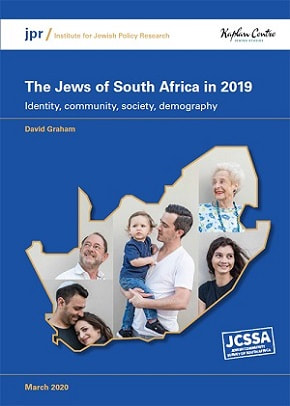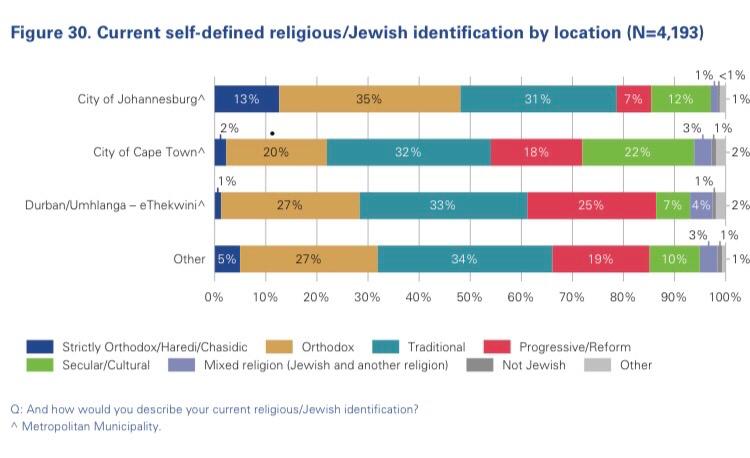By Irwin manoim
|
| And now we have a major research study, produced, like Dubb’s work, by the Kaplan Centre for Jewish Studies and Research, UCT, which tells us that by 2019, the Jewish population had fallen to 52 300. For those who might have missed the news, “The Jews of South Africa in 2019” was published at the end of April. The published report is the result of a study that involved a series of online surveys conducted last year, that gathered data on 5 287 individuals within 2 402 households, a figure which turned out to represent a tenth of our dwindling Jewish population. The survey was jointly produced by the Kaplan Centre along with the Institute for Jewish Policy Research in London, which did the bulk of the analytical work. The lead author was London based Dr David Graham, a geographer and statistician who has produced surveys of Jewish communities around the world. |
What happened to those missing South African Jews? Dubb was able to provide detailed tables of where they went – the most popular destinations then were the USA and Israel. (He himself immigrated to Israel.) What this new survey does, is tell us what happened next. In Australia, for example, where the Jewish population was always smaller than South Africa, it has now reached the same figure as South Africa at its peak, 118 000. On the western flank of Australia, which is where the bulk of South African Jews seem to settle, 28% of the Jewish population were born in South Africa. And since we know that those ex-South Africans have been flocking there for 50 years, there are uncounted multitudes of children, grandchildren and great grandchildren who might otherwise have grown up in South Africa.
Professor Adam Mendelsohn, director of the Kaplan Centre, estimates that between 2001 and 2016, 16 000 Jews emigrated, which comes to about three less Jews each day. A majority went to Australia, 4 863, against 2 812 to Israel and 2 444 to the UK.
Is this trend likely to continue? Some 15% of those surveyed said it was highly likely they too would emigrate, and of them, 51% said their destination of choice would be Israel. This overwhelming preference for Israel is a surprise (previous surveys put the US or Australia top of the list). But maybe Brexit and Donald Trump and the ever-rising barriers to migration erected in most countries have changed priorities – Jews can always get a foothold in Israel.
In the unlikely scenario that emigration ceases tomorrow, the picture is no less bleak. Mendelsohn notes “a significant rise in the median age of the Jewish population”, which will result in “the rate of natural decline within the community inevitably accelerating over the next decades. Cape Town and Durban will feel it much more than Johannesburg. By our estimate, the rate of natural decline in Cape Town is already a little over 100 per year, and will likely increase over the next three decades.”
The other subtheme of the report, never explicit, but visible in almost every chart, is that Johannesburg’s Jews and those of the rest of the country - Cape Town in particular - might as well be separate religious communities. This too is by no means new. Going way back to colonial times, the Cape Town community has always been more socially liberal and less strictly Orthodox, or to put it another way, Joburg is hard-edged and Cape Town is fuzzy round the edges.
The Jewish population is overwhelmingly concentrated in Johannesburg: 58% against 24% in Cape Town, with Durban at 7%. This too, goes back many years: Dubb put the 1991 Jewish population of Johannesburg at 59.9% against 22.2% for Cape Town. In 1960, it was 50.4% against 19.8%.
In Johannesburg, 48% describe themselves as Orthodox (35%) or strictly Orthodox (13%). In Cape Town, only 22% do - the same percentage as those who describe themselves as secular. Cape Town has almost twice the percentage of secular Jews as Johannesburg (12%) and three times as many as Durban (7%).
| The figure of 48% is odd, because when Dubb asked the same question thirty years earlier, 90.1% identified as Orthodox in Johannesburg and 84% in Cape Town. What confuses the table, to my mind, is the inclusion of a category called “Traditional”, which accounts for a third of respondents. “Traditional” is a label used on Jewish surveys in the US and UK, and in the interests of synergy it has crept into surveys here too. It denotes those who identify with the more old-fashioned strands of (non-Orthodox) Conservative Judaism, once dominant in the US. But I have never heard the term used in ordinary South African parlance, and I suspect that it caused some confusion. Lurking under that label are likely to be Orthodox Jews of various hues, a few actual Conservative Jews, and some who just wanted to tick the box in the middle. |
The more useful statistic is those who actually belong to synagogues (of which, by the way, there are apparently 103 still standing in South Africa). The membership figures, obtained directly from the synagogues’ own records, eliminate the sizable and notorious cohort of “unobservant Orthodox” who claim Orthodox affiliation but never set foot in shul. In fact, 41% of Jewish households in Johannesburg belong to no congregation, according to the survey. The more astonishing figure is that in Cape Town, 70% belong to no congregation.
Of those who do pay their membership fees, in Johannesburg, 91% belong to Orthodox shuls, leaving 9% as Progressive. In Cape Town, the Orthodox are at 75%, with the Progressive percentage up to 25%. The survey lumps all other towns together, and here the Progressive figure rises to 31%. Thus, outside of Johannesburg, Progressive Jewry is larger than it is generally given credit for. In Dubb’s 1991 survey, membership of Progressive congregations was already over a quarter in both Durban and Port Elizabeth. But he gave a figure of 15.7% for Progressive Jews in Cape Town, which means the community has grown substantially.
"The community is by no means as homogenous as it is made out to be, both by its leaders … and its enemies".
What this tells us is that the overwhelming Orthodox majority we take for granted, is not quite as impressive as claimed. In Johannesburg, Orthodox shul membership comes to 91% of 59%, making 53.7%. In Cape Town, it is 75% of 30%, making 22.5%. Despite imagined notions of a Jewish community largely united in its beliefs, there is a sizable number who don’t want to belong. And this keeps popping up in other tables:
- The 32% who attend shul either daily or every Shabbat can be juxtaposed against the 18% who attend no more than three times a year, to which one could add the 18% who never enter a synagogue.
- The 21% who refrain from using electricity on the Shabbat, and the 33% who keep kosher homes, can be juxtaposed against the 13% who are fine with having pork products in their homes.
- Some 71% of Gauteng Jews emphatically believe in God, against 51% in the Western Cape. Some 10% nationally are atheists, to which one could add 4% who incline perhaps to agnosticism and another 8% who have not made up their minds. Some 13.7% describe themselves as secular.
Some 6.7% have converted to Judaism, women more likely to convert than men. Some 48% of those were converted under Orthodox auspices. What is interesting is that the same number converted under Progressive auspices, perhaps because the process is less onerous. Given the much smaller size of the Progressive community, the proportion of “converts” would be considerably higher.
But it is attitudes to Israel and Zionism which are the most interesting. Our general self-image is that South Africa has always been among the most ardently Zionist communities in the Jewish diaspora, and that a reflexive “Israel right or wrong” attitude is the dominant mode. And indeed, the survey reveals that 78% strongly agree that Israel is the ancestral homeland of the Jews, only 3% dissenting. But asked whether they support Israel’s government, right or wrong, only 27% emphatically agree, with another 24% a little less sure. At the other end of the scale, 21 percent will not commit to supporting the Israeli government, right or wrong.
But it is attitudes to Israel and Zionism which are the most interesting. Our general self-image is that South Africa has always been among the most ardently Zionist communities in the Jewish diaspora, and that a reflexive “Israel right or wrong” attitude is the dominant mode. And indeed, the survey reveals that 78% strongly agree that Israel is the ancestral homeland of the Jews, only 3% dissenting. But asked whether they support Israel’s government, right or wrong, only 27% emphatically agree, with another 24% a little less sure. At the other end of the scale, 21 percent will not commit to supporting the Israeli government, right or wrong.
- Some 61% support the fundamental Zionist concept of a state specifically for the Jews, but remarkably, 12% oppose the concept, with another 8% unsure.
- A majority, 58%, believe it is acceptable to criticise Israel in the Jewish media; some 37% think it can be acceptable to criticise Israel in any media.
- Some 29.3% have views strongly aligned with those of the SA Zionist Federation, but 17.5% either seldom or never agree with their views. The Chief Rabbi does slightly worse: while 25% strongly agree with his views, 26% either often or never agree.
- While 83% strongly oppose boycotts of Israeli goods and academics, some 13% believe that boycotts are acceptable. That figure alone is astonishing: it means that there are almost twice as many Jews who think boycotts are acceptable than, say, those who identify as “strictly Orthodox”.
To conclude: the survey tells us many things that we suspected all along, but for which we had no supporting evidence. It tells us that the community has been foundering for years, and the hollowing out will continue until the day we are unable to hold a minyan. It also exposes some sizable holes in our self-belief. The community is by no means as homogenous as it is made out to be, both by its leaders … and by its enemies.
Irwin Manoim is an Honorary Researcher at the Kaplan Centre for Jewish Studies at UCT, with an interest in exploring previously ignored aspects of South African Jewish history. His recently published history of the Progressive Jewish movement in South Africa, Mavericks inside the Tent (UCT Press, 2020), has been held over for distribution until the COVID-19 lockdown has ended.
2 Comments
Pat Sidley
5/22/2020 08:05:18 pm
Will somebody please persuade Irwin to join Facebook. this is a really interesting article and Facebook would facilitate a good discourse on the topic. And having said in the Weekly Mail book that my grammar was bad, I found a grammatical error in this!
Reply
Stuart Brown
5/23/2020 11:32:45 pm
What about survey on age groups
Reply
Your comment will be posted after it is approved.


